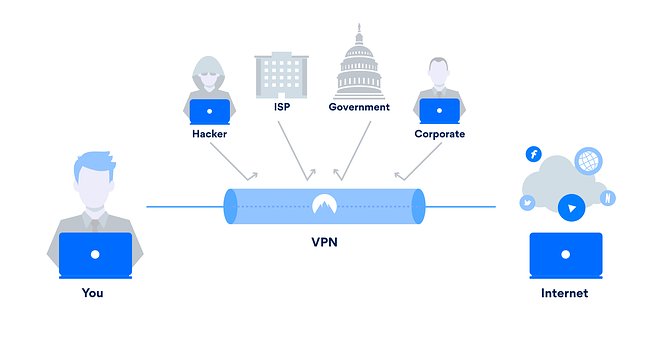If you are someone who has been keeping up with the happenings of the digital world, then you most certainly know what a VPN is. And even if you’re not so technically inclined and most of your online affairs can be summed up to using Facebook and email, you’ve probably at least heard of VPNs in passing. And there is a very good reason as to why VPNs are the topic of conversation so much nowadays; your privacy online is becoming more and more at risk.
The number of cybercrimes that occur every year continues to increase. Cybercriminals know the digital space far better than the average Internet user, and a lot of victims of cybercrimes have no idea until it’s far too late. Cybercriminals are a lot harder to track down than criminals in real life.
But wait! What about all these big tech companies? You know, the ones who sell us all our smart technology? Surely, they can help us out and do something to help ensure our safety and privacy online? Nope. In fact, they are in on it too.
Long story short, big tech companies aren’t much better than cybercriminals when it comes to invading your privacy. They want your data too for their own purposes. In some ways, these companies are worse than the average cybercriminal because it is (mostly) legal for them to harvest your data.
One of the biggest problems with the average consumer and the issue of cybercrimes is ignorance. People in real life take safety precautions to lessen the chances of them being victims of crimes. Lock your doors, shut your windows, all that jazz. But a lot of people still don’t realize how unsafe they are online, and as such, don’t take proper safety precautions.
There are a couple of things that consumers can do to help keep their online privacy intact and their data safe, but the first and most recommended thing a consumer can do is subscribe to a VPN service. VPNs can roughly be divided into three categories: free VPNs, cheap VPNs, and finally premium VPNs.
A VPN is a long-term investment and it should be treated as such. In many ways, your VPN is your first line of online defense, so you should aim for having the best of the best to protect you.
Since a VPN is going to be a crucial ally to you moving forward, I suppose you should know what it is and how exactly it helps protect you online.
What is a VPN?
A VPN, or Virtual Private Network, is a private network that allows you to securely access public networks. Ordinarily, when you connect to a website, your personal network itself connects to said unsecured website. With a VPN, a private server is the one that connects with the website you intend to use, keeping any potential dangers away from your personal data.
How does a VPN keep me safe online?
VPNs keep users safe in several different ways. The first, as stated above, is no longer do VPN users directly access public networks with their own network. If your data is never put out there for the criminals lying in wait, then they can’t get their hands on your data, can they?
Another way VPNs protect you, is by altering your IP address. Your IP address can be used to track you and your activity online, which is something that ISPs regularly do. With a VPN, you no longer use your personal IP address. Instead, you pick a server from your VPN service’s list of servers and use an IP address given to you by your VPN service provider. You could be living in the United States and using an IP address in Argentina. Even if snoopers figure out your IP address, that info won’t be of any use to them.
Public Wi-Fi is very convenient, but it is also very unsafe. And since pretty much every type of establishment has Wi-Fi nowadays, you are likely putting your data at risk numerous times a day on numerous networks. With a VPN, you can continue to use public Wi-Fi networks, but feel safe because a VPN will keep your business online private; even if you’re using public Wi-Fi.
The reason why having a VPN goes a long way towards keeping your data safe online is because VPNs encrypt your data. We’re talking military-grade encryptions that hackers aren’t likely to breach through. Hackers typically aim for easy marks and give up whenever they face any stiff opposition.
There are numerous reasons as to why consumers should only subscribe to a premium VPN service, and two of those reasons are DNS leak protection and kill-switch functionality. DNS (Domain Name System) leaks, allow annoying ISPs to still see what you are doing online (Even if you are using a VPN). DNS leaks are the result of DNS requests being sent straight to ISPs instead of through your VPN. To avoid this, make sure to choose a VPN with DNS leak protection.
Another big plus to getting a premium VPN is the kill-switch feature that nearly all top VPN services have. Ordinarily, if your VPN service drops out for any reason, then your previously safe data is now completely exposed. When your data is compromised, it doesn’t take long for things to go from bad to worse. A VPN with a kill-switch prevents that.
If your VPN service ever drops out, if your VPN has a kill-switch, then it will drop everything you are doing. Any website or app access will be shut down until your VPN reestablishes the connection. That means that even if your VPN stops working temporarily, your data will still be safe.
There is a good amount of premium VPN services to choose from, all with their own pros and cons. This article only goes over how VPNs can protect you and your data online but doesn’t go over some of the other benefits that VPNs provide. Said benefits which might affect which VPN service you choose to subscribe to. That’s a discussion for another day. For now, we just hope that you have become aware of the dangers of life online, and how VPNs can keep you safe from them.












